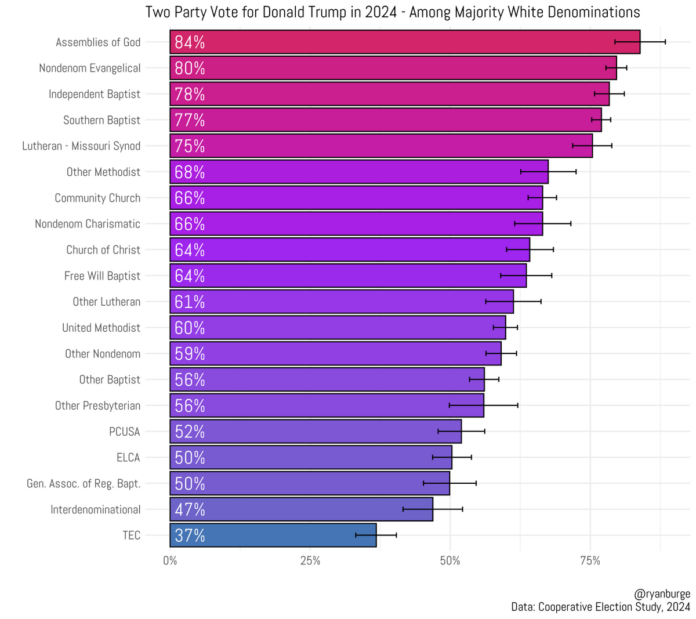In the 2024 presidential election, a detailed analysis of voting patterns among majority-white religious denominations reveals surprising insights into the support for Democratic candidate Kamala Harris. According to data from the Cooperative Election Study 2024, shared by analyst Ryan Burge, while Donald Trump secured strong support across many white denominational groups, Harris managed to gain significant traction among a few key denominations.
The chart, titled “Two Party Vote for Donald Trump in 2024 – Among Majority White Denominations,” shows the percentage of votes Trump received within each group, allowing us to infer Harris’s support by subtracting Trump’s share from 100%. Based on this data, the top three majority-white denominations that leaned most heavily toward Harris were:
- TEC (The Episcopal Church) – Harris secured 63% of the vote among Episcopalians, with Trump receiving only 37%. This denomination, known for its progressive stances on social issues, showed a clear preference for Harris, reflecting a broader trend of liberal-leaning mainline Protestant groups favoring Democratic candidates.
- Interdenominational – With Trump garnering 47% of the vote, Harris captured 53% of the interdenominational group. This category, often comprising congregations that blend traditions or prioritize ecumenical collaboration, demonstrated a slight but notable tilt toward Harris, possibly due to their diverse theological perspectives and openness to social change.
- Gen. Asso. of Reg. Bapt. (General Association of Regular Baptists) – Harris also secured 50% of the vote in this group, tying with Trump, who also received 50%. While this denomination is more conservative-leaning historically, the even split suggests a significant portion of its members were swayed by Harris’s platform, marking a departure from the broader trend of Baptist groups heavily favoring Trump.
These results highlight a divide within majority-white denominations, where more progressive or ecumenical groups like the Episcopal Church and interdenominational congregations showed stronger support for Harris compared to their evangelical counterparts. For instance, denominations like the Assemblies of God and Nondenominational Evangelicals gave Trump 84% and 80% of their votes, respectively, underscoring the evangelical base’s loyalty to the Republican candidate.
The data suggests that Harris’s appeal among these top three denominations may stem from her campaign’s focus on social justice, racial equity, and inclusive policies, which resonate with the values of more liberal-leaning or ecumenical religious groups. As the 2024 election data continues to be analyzed, these voting patterns offer a glimpse into the evolving political landscape within America’s religious communities.
Source: Cooperative Election Study 2024, analyzed by Ryan Burge.
